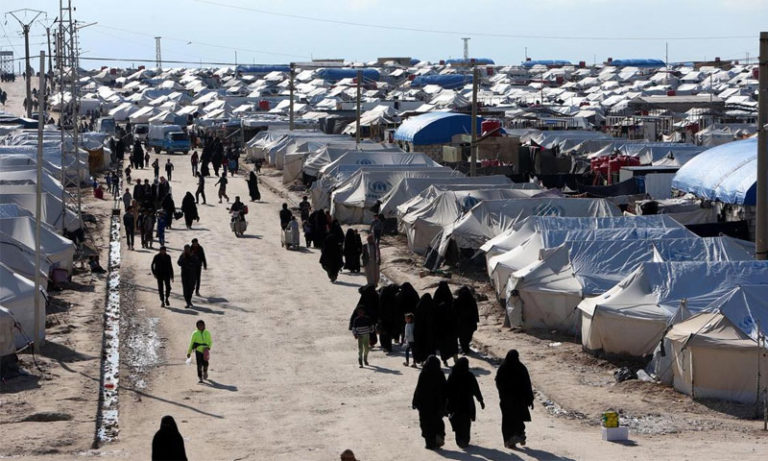The Iraqi Ministry of Migration and Displacement announced that the number of returnees from the al-Hol camp in northeastern Syria to Iraq has reached around four thousand people. The ministry pointed to an agreement between the federal government and the Kurdistan region on the necessity of returning the displaced in the camps of Erbil and Duhok to their original areas.
Kareem al-Nouri, the deputy minister, told the Rudaw network (headquartered in Erbil) yesterday, Monday, August 19th, that the al-Hol camp includes approximately 53 thousand people of different nationalities, including 20 thousand Iraqis.
He added that most countries in the world were hesitant to withdraw their citizens, while al-Hol has become a “breeding ground” for the Islamic State group, which might be more dangerous than the group that appeared in 2014. He clarified that “some may currently claim that they are time bombs, but their stay in al-Hol makes them ticking bombs that need to be dismantled.”
The Iraqi deputy minister noted that his country has succeeded to some extent through security scrutiny and procedures by some supporting bodies in the ministry to return many who were not involved in Iraqi bloodshed.
He considered that the Iraqi state “does not deal with retaliation and revenge,” as it should have “standards to act towards those who were not involved in bloodshed,” noting that offenders will face the judiciary.
Al-Nouri expressed the ministry’s confidence in its ability to rehabilitate thousands of returning individuals from the camp to Iraq.
At the end of last April, Iraq received a new batch of Iraqi families from the al-Hol camp in the eastern city of al-Hasakah, northeastern Syria.
The Hawar agency, close to the Autonomous Administration of North and East Syria (AANES), mentioned that within the framework of coordination with the security committee and the Migration and Displacement Committee in the Iraqi parliament, a batch of Iraqis, consisting of 714 people within 191 Iraqi families, left the al-Hol camp.
Last July 19th, the United States revealed that there are about 27 thousand people in the al-Hol and al-Roj camps, which house the families of Islamic State militants, and they hail from more than 60 countries.
The US State Department said that most of the residents of the camps are children under the age of 12, who “deserve a chance to live outside the harsh conditions of the camps.”
The ministry added that 22 women and children from Kyrgyzstan left the camps, marking the second return of citizens from this state and the sixth comprehensive repatriation operation since February 2023.
The al-Hol camp, managed by the Syrian Democratic Forces (SDF) in eastern al-Hasakah, originally housed about 50 thousand people, including Syrians and Iraqis, mostly women and children, and more than ten thousand foreigners from around 60 other countries when it was established.
The camp took its current shape after large numbers of displaced people flowed in from areas that were under the control of the Islamic State following attacks launched by the SDF against its last strongholds, declaring its end on March 23, 2019.
The SDF also manages prisons holding Islamic State fighters and members, some of whom are foreigners. They had previously attempted to persuade their countries to repatriate them, but progress in this matter has not been achieved.











